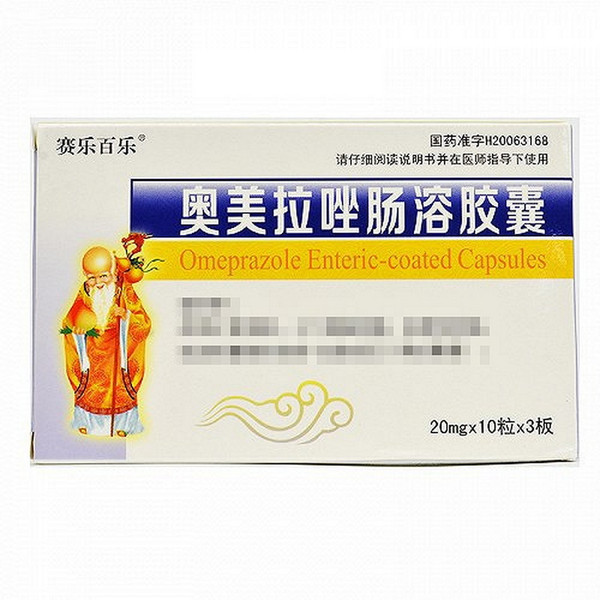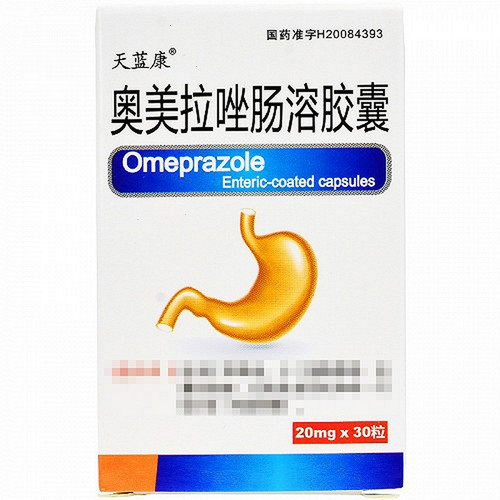Product Overview
[Drug Name]
Generic Name: Omeprazole Enteric-Coated Capsules
Trade Name: SaiLeBaiLe Omeprazole Enteric-Coated Capsules 20mg x 30 Capsules
Pinyin Full Code: SaiLeBaiLe AoMeiLaZuoChangRongJiaoNang 20mg x 30Li
[Main Ingredients]
The main ingredient of this product is omeprazole.
[Properties]
This product is a capsule containing white or off-white enteric-coated micropellets.
[Indications/Main Functions]
Indicated for peptic ulcers (stomach and duodenum), reflux esophagitis, and Zollinger-Ellison syndrome (gastrinoma).
[Specifications]
20mg x 30 capsules (SaileBaiLe)
[Dosage and Administration]
This drug must be swallowed whole. Do not chew or crush it. Do not crush it in food. 1. Peptic ulcer: Take 20mg (one capsule at a time) 1-2 times daily. Take orally in the morning or once in the morning and evening. The treatment course for gastric ulcers is usually 4 to 8 weeks, and for duodenal ulcers is usually 2 to 4 weeks. 2. Reflux esophagitis: Take 20 to 60 mg (1 to 3 tablets at a time) once or twice daily. Take orally in the morning or once in the morning and evening. The treatment course is usually 4 to 8 weeks. 3. Zollinger-Ellison syndrome: Take 60 mg (3 tablets at a time) once daily. The total daily dose can be adjusted to 20 to 120 mg (1 to 6 tablets) depending on the condition. If the total daily dose exceeds 80 mg (4 tablets), it should be taken in two divided doses.
[Adverse Reactions]
This product is well tolerated. Adverse reactions may include: 1. Digestive system: May cause dry mouth, mild nausea, vomiting, abdominal distension, constipation, diarrhea, and abdominal pain; Elevated alanine aminotransferase (ALT), aspartate aminotransferase (AST), and bilirubin levels may be mild and transient, and most do not affect treatment. In addition, international data have reported that gastric mucosal cell hyperplasia or atrophic gastritis may be observed in gastric corpus biopsy specimens of patients treated with long-term omeprazole therapy. 2. Neuropsychiatric: Symptoms may include paresthesias, dizziness, headaches, drowsiness, insomnia, and peripheral neuritis. 3. Metabolic/endocrine: Long-term use of omeprazole may lead to vitamin B12 deficiency. 4. Other: Symptoms may include rash, gynecomastia, and hemolytic anemia.
[Drug Interactions]
1. Avoid concomitant use with oral imidazole antifungals such as ketoconazole, itraconazole, miconazole, and fluconazole. 2. Concomitant use of omeprazole with clarithromycin may increase the incidence of central nervous system (primarily headache) and gastrointestinal adverse reactions. 3. Avoid concomitant use with diazepam (Valium), phenytoin, warfarin, nifedipine, digoxin, cisapride, quinidine, caffeine, and theophylline. 4. If used concurrently with other medications, drug interactions may occur. Please consult your physician or pharmacist for details.
[Precautions]
1. Use with caution in patients with renal or severe hepatic impairment. 2. Effects of the drug on diagnosis: ① Omeprazole may inhibit gastric acid secretion, increasing gastric pH, which in turn triggers the secretion of gastrin by G cells in the gastric mucosa, thereby increasing blood gastrin levels. ② Omeprazole may cause false-negative results in the 13C-urea breath test (UBT). The mechanism may be a direct or indirect inhibitory effect of omeprazole on Helicobacter pylori (Hp). Clinically, the 13C-urea breath test should not be performed until at least 4 weeks after omeprazole treatment. 3. Items that should be checked or monitored before, during, and after medication use: ① Monitoring of therapeutic efficacy. When treating peptic ulcers, an endoscopic examination should be performed to determine if the ulcer has healed. When treating H. pylori-related peptic ulcers, a UBT test can be performed 4-6 weeks after treatment completion to determine if H. pylori has been eradicated. When treating Zollinger-Ellison syndrome, basal gastric acid secretion should be measured to ensure it is less than 10 mEq/h (i.e., the treatment target). ② Toxicity monitoring: Liver function tests should be performed regularly. Long-term users should regularly examine the gastric mucosa for tumor-like hyperplasia. Serum vitamin B12 levels should also be monitored for users taking the drug for more than 3 years. 4. When treating gastric ulcers, this drug should be used only after the possibility of cancer has been ruled out. This medication can alleviate symptoms and thus delay treatment. 5. To prevent excessive acid suppression, long-term, high-dose use of this drug is not recommended for the treatment of general peptic ulcers (except in Zollinger-Ellison syndrome).
[Use in Elderly Patients]
This is not yet clear.










